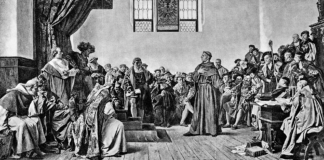Every family has a story | Why you should know yours
“We all feel stronger if we are part of a tapestry. One thread alone is weak, but, woven into something larger, surrounded by other threads, it is more difficult to unravel,” says family therapist Stefan Walters, summarising the benefits of understanding the history of the family we come from.
Books: from windows on the world to mirrors reflecting our inner selves
I’ll never be able to separate the memories of childhood from that of books. They intertwine like colours in fabrics, in a jumble of real and fantastical, bitter and sweet, joy and guilt.
How false religious conspiracy theories came to abound
The documentary The Resurrection Tomb is based on James Tabor and Simcha Jacobovici’s book The Jesus Discovery[1] and resumes a controversial topic, also published in 2007, when a similar film was released.
The Protestant Reformation: Between obstinacy and necessity
Five hundred years ago, Luther nailed his 95 theses to the door of Wittenberg Cathedral. How are the motives that led to the Reformation viewed today?
The price of pleasure | Favourite myths of the porn industry
Confessions of former porn addicts and their parents or life partners, as well as shocking confessions made by actors in the porn industry reveal what lies behind the XXX curtain.
“More than a carpenter” | Book review
Josh McDowell, founder of the trans-denominational Christian organisation Campus Crusade for Christ and author of More Than a Carpenter, is known to the public after a decades-long career and having had several volumes published in the field of apologetics.
Blood is (not always) thicker than water | Sibling estrangement, from causes to solutions
For at least one party, sibling estrangement can be more painful than loss through death, writes Fern Schumer Chapman, who was excluded from her brother's life for four decades.
My journey to Bethlehem
They say that "all roads lead to Rome". This famous saying originated in ancient times with the extensive network of roads built by the Romans to facilitate communication and travel throughout their empire.
The false dilemma: Are there really only two choices?
The false dilemma fallacy presents an issue as if there are only two ways to solve it—often, two opposite ways—when, in fact, there are more ways than that. The conflict between the two ways presented is also false.
Case closed…32 years later
"Even if you're imprisoned for life, that's still a short time. After that, Jesus will come back. All you have to do is try to make the best of the situation you're in' (Lindy Chamberlain).
The Waldenses | The poor of Christ
The “poor of Christ”, the “poor of Lyon” or, simply, the “brothers” never called themselves “Waldenses” until they joined the Reformation. The derisive appellative was given to them by their persecutors, after the name of the man who consolidated the doctrine of the community.
Avicii: true stories
With his hands clasped on the barbell, the superstar stares blankly and tells his personal trainer that his body needs time to adjust because he has been suffering from anxiety for a long time. Because of this, his body does not differentiate between cardio and panic. Two years later, on April 20th, 2018, the lifeless body of the famous DJ Avicii was found...
Stories with happy endings | How to keep going despite the obstacles
For some people, suffering is temporary. For others, life itself can be a long series of painful blows. However, experience shows that recovery is possible even when people seem to be at the end of their tether.
Learning from Wave Rock
If you’re reading this article in July of 2024, there’s a good chance I already have climbed or am currently climbing Wave Rock. Called Katter Kich in the Nyungar dialect, Wave Rock is an enormous granite cliff face in the shape of—you guessed it—a wave that protrudes from the surface of the earth in the middle of Western Australia’s Wheatbelt. It forms the...
How people have viewed earthquakes throughout history
Earthquakes have always struck fear into the hearts of people who didn't know why the earth was shaking but who saw how easily their possessions or loved ones could be lost to such tremors.


























